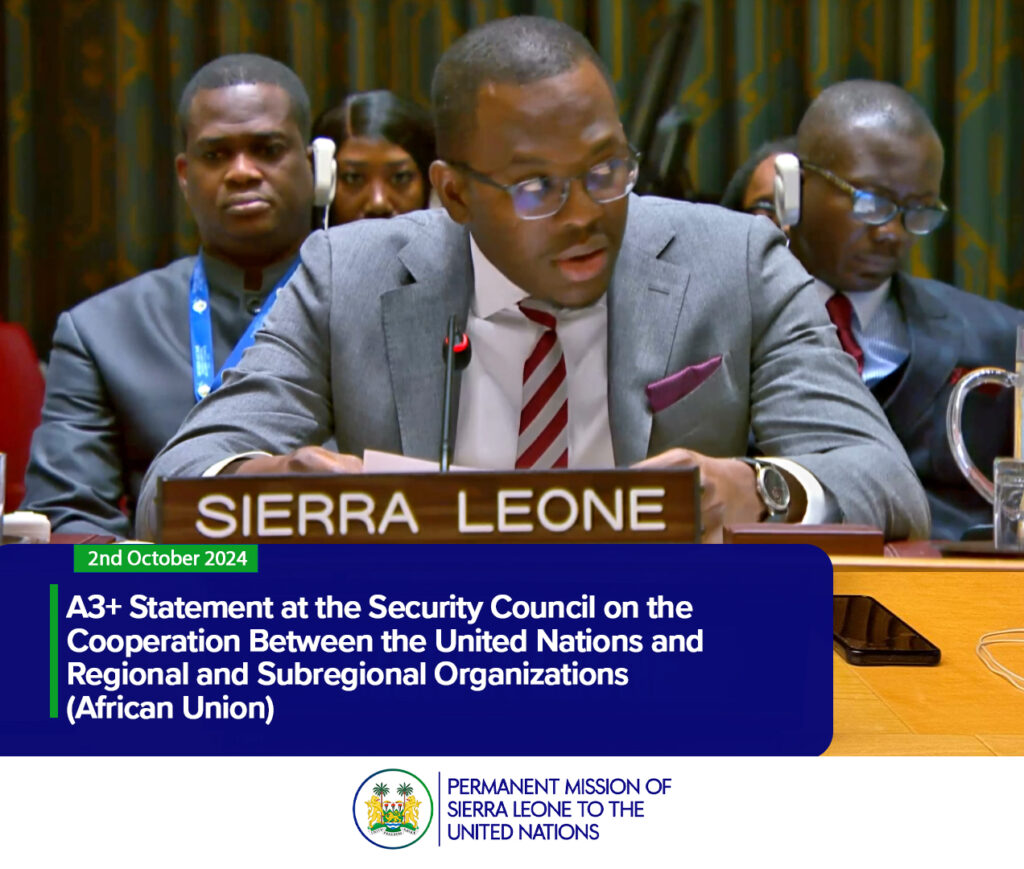STATEMENT BY:
H.E. DR. MICHAEL IMRAN KANU
AMBASSADOR AND PERMANENT REPRESENTATIVE
Madam President,
I have the honor to deliver this statement on behalf of the A3+, namely Algeria, Mozambique, Guyana, and my country Sierra Leone.
We have listened attentively to the important updates by Special Representative of the Secretary-General, Parfait Onanga-Anyanga, African Union Permanent Observer to the United Nations, H. E. Ms. Fatima Kyari Mohammed and Assistant Secretary-General for Africa, Martha Ama Akyaa Pobee.
We thank the Secretary-General for his annual report and commend his continued personal leadership in strengthening and deepening one of the most critical partnerships of our time: the cooperation between the United Nations (UN) and the African Union (AU).
This partnership, rooted in the 2017 UN-AU Framework for Strengthening the Partnership for Peace and Security, stands as a testament to the spirit of Article 53 of the UN Charter.
The continued recognition of Article 53’s enduring validity is evident in Action 21 of the recently adopted Pact for the Future, in which the African Group played a pivotal role.
Continued cooperation between the (UN) and (AU) is essential to achieving the vision of collaboration and collective action outlined in the New Agenda for Peace, which is founded on the principles of trust, solidarity, and universality.
Madam President,
Allow me to highlight some of the key strategic and pressing issues in the report that define this partnership and shape the path ahead.
First, implementing Resolution 2719 in a balanced and realistic manner remains a top priority. This resolution marks a significant step forward toward providing adequate, predictable, and sustainable financing for African Union-led peace support operations.
As highlighted by Assistant Secretary-General Martha Pobee, significant efforts have been made to translate this agreement into actionable policy.
We commend the collaborative efforts of the UN-AU Joint Task Force on Peace and Security, which developed a roadmap centered on four key workstreams aimed at preparing both organisations to effectively activate and operationalize UNSCR 2719, on a case-by-case basis.
Supporting the AU in this manner is not just about providing resources; it empowers Africa to develop the capacity to resolve its own conflicts and sustain peace on its own terms.
As penholders and Africa’s voice in the Council, the A3+ will continue to play a leading role and take a keen interest in the implementation and refinement of this critical tool in our peace and security toolbox.
This brings me to my second point: the importance of African ownership, embodied in the principle of ‘African solutions to African challenges.‘
Despite immense challenges, the AU has consistently demonstrated its capacity to leverage its comparative advantages and act as the first responder to the continent’s security threats, whether through mediation efforts or the deployment of peace support operations.
As we commemorate two decades of the AU Peace and Security Council (PSC), it is crucial to ensure that the African Peace and Security Architecture is equipped with the agency, resources, and political support needed to effectively shape the continent’s security landscape.
This effort includes reflecting Africa’s positions into the deliberations of the UN Security Council, whether in establishing mandates for UN Peacekeeping Operations, reviewing sanctions regimes, sequencing mediation efforts, or coordinating humanitarian interventions across the region.
Thirdly, let us reaffirm that political solutions are at the core of sustainable peace.
Governance deficits, unconstitutional changes of government and political exclusion remain root causes of instability in many regions, particularly in the Sahel region.
In this vein, strengthening inclusive, accountable governance and upholding the rule of law are essential to breaking cycles of violence.
It is equally crucial to ensure that women, youth, and marginalized communities are not only participants in the dialogue but are empowered to lead it, making them not just beneficiaries of peace, but also its architects.
Madam President,
Let me briefly turn to challenges that demand the urgent and sustained attention of our partnership.
There is an urgent need to address the humanitarian crisis in conflict hotspots across the continent, with Sudan standing out as a critical emergency.
The UN-AU partnership must continue to lead humanitarian response efforts, ensuring that aid and shelter reach those in need.
Moreover, we must address the persistent threat of terrorism and violent extremism, which affects nearly every region of the continent, particularly the Sahel region of West Africa.
This issue, along with vigilance towards addressing its evolving forms, must remain a top priority on our partnership’s agenda.
Last but not least, when addressing security, we must not overlook the growing and adverse impact of climate change on peace and development in Africa.
Our partnership must continue to prioritize innovative solutions that mitigate the environmental drivers of conflict and strengthen resilience in vulnerable communities.
Madam President,
Amidst this backdrop of multiple, intersecting and immediate challenges in a volatile global context, it is imperative that we continually fine-tune, evolve, and deepen the coordination mechanisms of our partnership.
In this regard, we acknowledge the continued consolidation of various modes of interaction between the two organizations, including the monthly informal coordination meetings between the incoming President of the Security Council and the incoming Chairperson of the AUPSC, as well as the joint retreat of AU and UN special representatives and envoys.
We also look forward to engaging with the African Union Peace and Security Council (AUPSC) under your Presidency at the upcoming 18th Joint Annual Consultative Meeting and 9th Informal Annual Joint Seminar, where we anticipate comprehensive discussions on the guidelines and modalities for implementing Resolution 2719 (2023).
Additionally, we will closely follow the 8th United Nations-African Union Annual Conference between the Secretary-General and the Chairperson of the African Union Commission.
To conclude, the A3+ reiterates its firm belief that the true value of the UN-AU partnership will be fully realized when the continent is represented, with equal rights and responsibilities in this very body, through the long-overdue and pressing reform of the Security Council.
I thank you.



